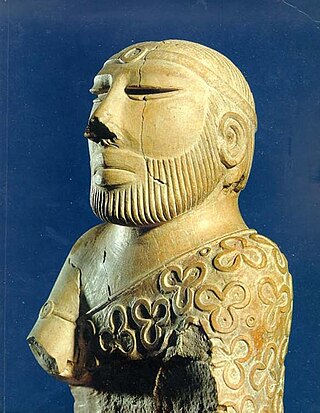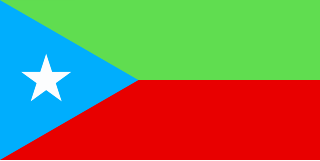Related Research Articles

Balochistan is a province of Pakistan. Located in the southwestern region of the country, Balochistan is the largest province of Pakistan by land area but is the least populated one. It is bordered by the Pakistani provinces of Khyber Pakhtunkhwa to the north-east, Punjab to the east and Sindh to the south-east; shares international borders with Iran to the west and Afghanistan to the north; and is bound by the Arabian Sea to the south. Balochistan is an extensive plateau of rough terrain divided into basins by ranges of sufficient heights and ruggedness. It has the world's largest deep sea port, the Port of Gwadar lying in the Arabian Sea.

The Baloch or Baluch are a nomadic, pastoral, ethnic group which speaks the Western Iranic Baloch language and is native to the Balochistan region of South and Western Asia, encompassing the countries of Pakistan, Iran, and Afghanistan. There are also Baloch diaspora communities in neighbouring regions, including in Central Asia, and the Arabian Peninsula.
Prince Agha Abdul Karim Ahmedzai was the younger brother of the last Khan of Kalat, Mir Ahmedyar Khan.

The history of Balochistan refers to the history of the Balochistan region of Pakistan, Iran and Afghanistan. Vague allusions to the region were found in Greek historical records of around 650 BCE. Prehistoric Balochistan dates to the Paleolithic.

The Chief Commissioner's Province of British Baluchistan was a province of British India established in 1876. Upon the creation of Pakistan it acceded to the newly formed state. It was part of the Baluchistan Agency. It was dissolved to form a united province of West Pakistan in 1955 upon the creation of One Unit Scheme.

The Khanate of Kalat was a Brahui Khanate that originated in the modern-day Kalat region of Pakistan. Formed in 1666 due to the threat of Mughal expansion in the region, it controlled the wider Balochistan at its greatest extent in the mid-18th century, extending from Kerman in the west to Sindh in the east and from Helmand river in the north to the Arabian sea in the south. Khanate of Kalat lost considerable area to Qajar Iran and Emirate of Afghanistan in the early 19th century, and the city of Kalat was itself sacked by the British in 1839. Kalat became a self-governing state in a subsidiary alliance with British India after the signature of the Treaty of Kalat by the Khan of Kalat and the Baloch Sardars in 1875, and the supervision of Kalat became task of the Baluchistan Agency. Kalat was briefly independent from 12 August 1947 until 27 March 1948, when its ruler Ahmad Yar Khan acceded to Pakistan, making it one of the Princely states of Pakistan.

Makran was an autonomous princely state in a subsidiary alliance with British India until 1947, before being absorbed as an autonomous princely state of Pakistan. It ceased to exist in 1955. It was located in the extreme southwest of present-day Pakistan, an area now parts of the districts of Gwadar, Kech and Panjgur. The state did not include the enclave of Omani Gwadar, which was under Omani rule until 1958.

Ghaus Bakhsh Bizenjo was a Pakistani politician from Balochistan. He served as the 3rd Governor of Balochistan.

The Insurgency in Balochistan is an insurgency or revolt by Baloch separatist insurgents and various Islamist militant groups against the governments of Pakistan and Iran in the Balochistan region, which covers the Pakistani province of Balochistan, Iranian province of Sistan and Baluchestan, and Balochistan of southern Afghanistan. Rich in natural resources, this is the largest, least populated and least developed province in Pakistan and Iran, and armed groups demand greater control of the province's natural resources and political autonomy. Baloch separatists have attacked civilians from other ethnicities throughout the province. In the 2010s, attacks against the Shia community by sectarian groups—though not always directly related to the political struggle—have risen, contributing to tensions in Balochistan. In Pakistan, the ethnic separatist insurgency is low-scale but ongoing mainly in southern Balochistan, as well as sectarian and religiously motivated militancy concentrated mainly in northern and central Balochistan.

Balochistan is a historical region in Western and South Asia, located in the Iranian plateau's far southeast and bordering the Indian Plate and the Arabian Sea coastline. This arid region of desert and mountains is primarily populated by ethnic Baloch people.
Nawab Mir Yousaf Aziz Magsi was a co-founder of the Anjuman-e-Ittehad-e-Balochan-wa-Balochistan alongside Abdul Aziz Kurd. In 2011, a commemorative seminar was held at the National Language Authority in Islamabad.

Baloch nationalism is an ideology that asserts that the Baloch people, an ethnic group native to Pakistan, Iran and Afghanistan, form a distinct nation. The origins of modern Baloch nationalism coupled with the insurgency in Balochistan involving various militant organizations, go back to the period of the partition of British India and subsequent independence of Pakistan, when Kalat, the largest Baloch princely state, acceded to the Dominion of Pakistan.

Gul Khan Naseer also known as Malek o-Sho'arā Balochistan ; 14 May 1914 – 6 December 1983) was a Pakistani politician, poet, historian, and journalist from Balochistan. Most of his work is in Balochi language, but he also wrote in English, Urdu, Brahui and Persian.
The Kalat State National Party (KSNP) was a Baloch nationalist political party in Balochistan in the princely state of Kalat from 1937 to 1948. They sought independence from British and full restoration of the Khanate of Kalat.
Abdul Aziz Kurd (1904–1979) was a co-founder of the Anjuman-e-Ittehad-e-Balochan-wa-Balochistan. Among the pioneering Baloch nationalists, he wished to establish an independent Balochistan.

Human rights abuses in the province ofBalochistan refers to the human rights violations that are occurring in the ongoing insurgency in Balochistan. The situation has drawn concern from the international community, The human rights situation in Balochistan is credited to the long-running conflict between Baloch nationalists and Pakistani security forces.

The princely states of Pakistan were princely states of the British Indian Empire which acceded to the new Dominion of Pakistan between 1947 and 1948, following the partition of British India and its independence.

Khan Mir Sir Ahmad Yar Khan Ahmedzai (1902–1979), commonly referred to as Yar Khan, was the last Khan of Kalat, a princely state in a subsidiary alliance with British India and the Dominion of Pakistan, serving from 10 September 1933 to 14 October 1955.
The Anjuman-i-Watan, Baluchistan, commonly called Anjuman-i-Watan, was a political party in British India based in the province of Baluchistan. It was led by Abdul Samad Khan Achakzai.
Nawab Mohammad Khan Jogezai was a Pashtun tribal elder and the only representative from Baluchistan Province to the Constituent Assembly of Pakistan.
References
- ↑ "Inside Kalat: Review of Back to the Future". Dawn.com . May 31, 2009. Retrieved November 10, 2017.
- ↑ Martin Axmann (2008). Back to the Future: The Khanate of Kalat and the Genesis of Baloch Nationalism, 1915-1955. Oxford University Press. p. 155. ISBN 978-0199-06592-9.
- ↑ Talbot, Ian (1988). Provincial Politics and the Pakistan Movement: The Growth of the Muslim League in North-west and North-east India 1937-47. Oxford University Press. p. 117. ISBN 9780195773873.